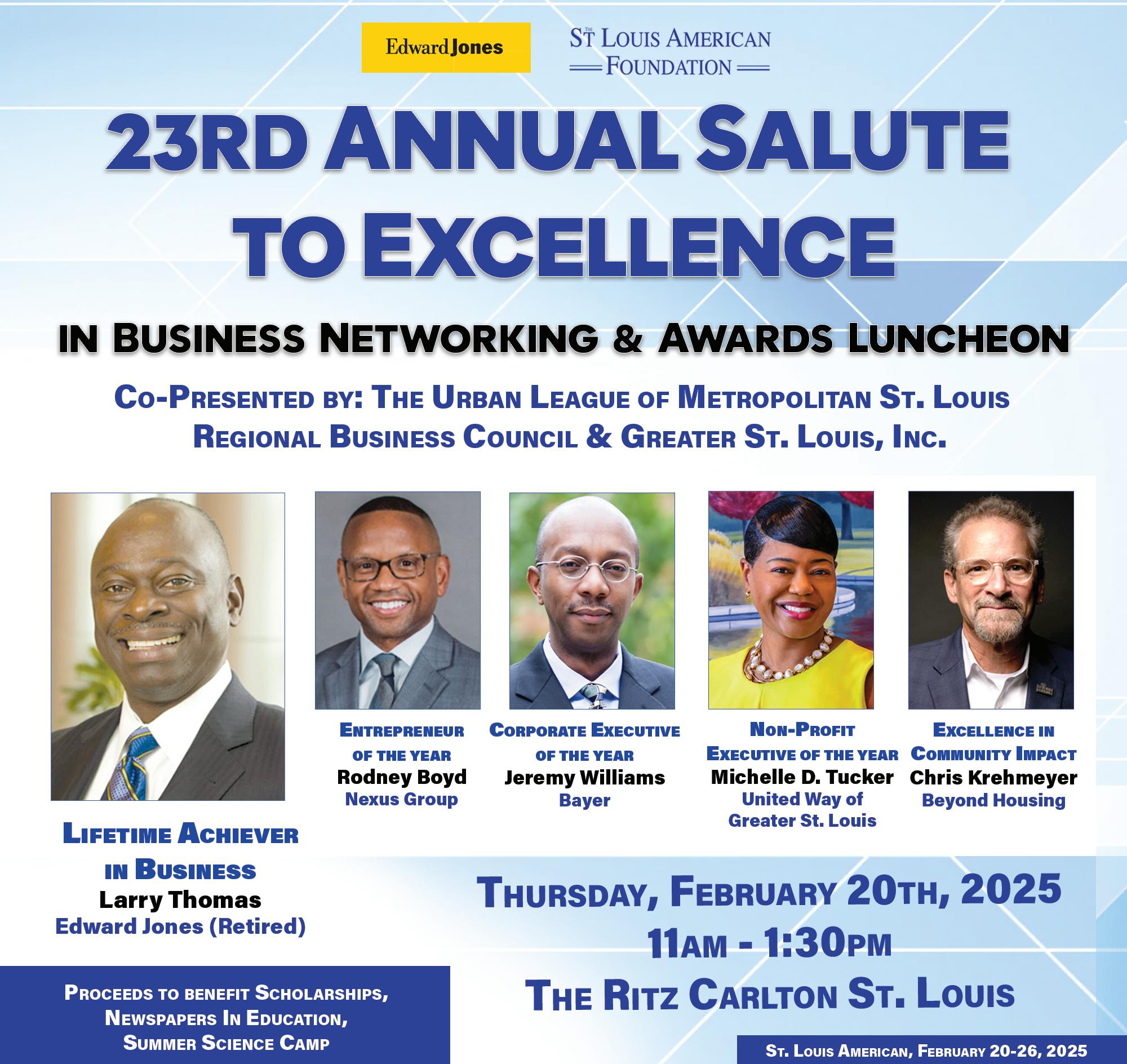




By Alvin A. Reid St. Louis American
While the national political climate has resulted in an increase in hostility toward efforts in supporting equity and inclusion in the business sector, the storm of misinformation and ignorance that has created this wave of bias must be challenged and strongly resisted.

The St. Louis American Foundation, which annually honors individuals and organizations dedicated to more inclusive and equitable growth, is proud to partner with 2025 co-presenters the Urban League of Metropolitan St. Louis, the Regional Business Council, and Greater St. Louis Inc., in celebrating the 23rd annual Salute to Excellence in Business Networking and Awards Luncheon.
McMillan President, Urban League of Metropolitan St. Louis

Branding President and CEO, Regional Business Council
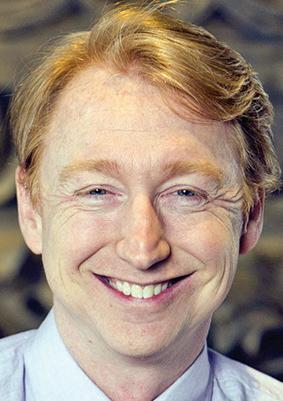
Dustin Allison Interim CEO, Greater St. Louis, Inc.

Michael Holmes St. Louis American Foundation Board Chair
is proud to partner with the St. Louis American Foundation and the No. 1 African American newspaper in the country on its annual Salute to Excellence in Business.”
“The Foundation salutes Edward Jones, the lead sponsor of the Salute to Business, and Larry Thomas, a retired Edward Jones partner, who is honored as the Lifetime Achiever in Business,” said St. Louis American Foundation Board Chair Michael Holmes.
“The St. Louis American Foundation and these three organizations are determined to create more inclusive regional growth,” said Donald M. Suggs, St. Louis American Foundation founder and a member of its board of directors.
“Everyone should have a chance to succeed, so it is so appropriate that these groups come together because we all are committed to equity and inclusion and share the belief that all communities in the St. Louis area should be included in
the sustained economic growth we are working to achieve.”
“DEI (Diversity, Equity and Inclusion) success is essential to the success of the country,” said Urban League President and CEO Michael P. McMillan.
“Making sure that everyone has a seat at the table and is included means that we will maintain this country’s global dominance as the greatest economy in the world. Growing our economy with diverse businesses is good for everyone.”
Karen Branding, Regional Business Council president and CEO, said, “RBC remains committed to the minority busi-
ness community.”
“We enthusiastically support the celebration of the 23rd Salute to Excellence in Business and its recognition of Black excellence.”
Dustin Allison, Greater St. Louis Inc., interim CEO said the organization’s mission “is to drive economic growth so that everyone in the St. Louis region, regardless of race, zip code, or any other factor, has the opportunity to thrive.”
“We are proud to once again support the St. Louis American Foundation and this year’s award winners for their commitment to inclusive growth.”
McMillan added, “The Urban League
Also being honored are: Rodney Boyd, a Nexus Group partner, 2025 Entrepreneur of the Year; Jeremy Williams, head of Climate LLC, Digital Farming and Commercial Ecosystems for the Crop Science division of Bayer, Corporate Executive of the Year;
Michelle D. Tucker, United Way of Greater St. Louis president and CEO, Non-Profit Executive of the Year; and Chris Krehmeyer, Beyond Housing president and CEO, Excellence in Community Impact Award recipient. The Foundation also thanks luncheon emcee Rene Knott, KSDK 5 On Your Side Today in St. Louis morning co-anchor.
Larry Thomas Edward Jones (retired) Lifetime Achiever In Business
Rodney Boyd Nexus Group Entrepreneur of the Year
Jeremy Williams Bayer Corporate Executive of the Year
Michelle D. Tucker United Way of Greater St. Louis Non-Profit Executive of the Year
Chris Krehmeyer Beyond Housing Excellence In Coummunity Impact
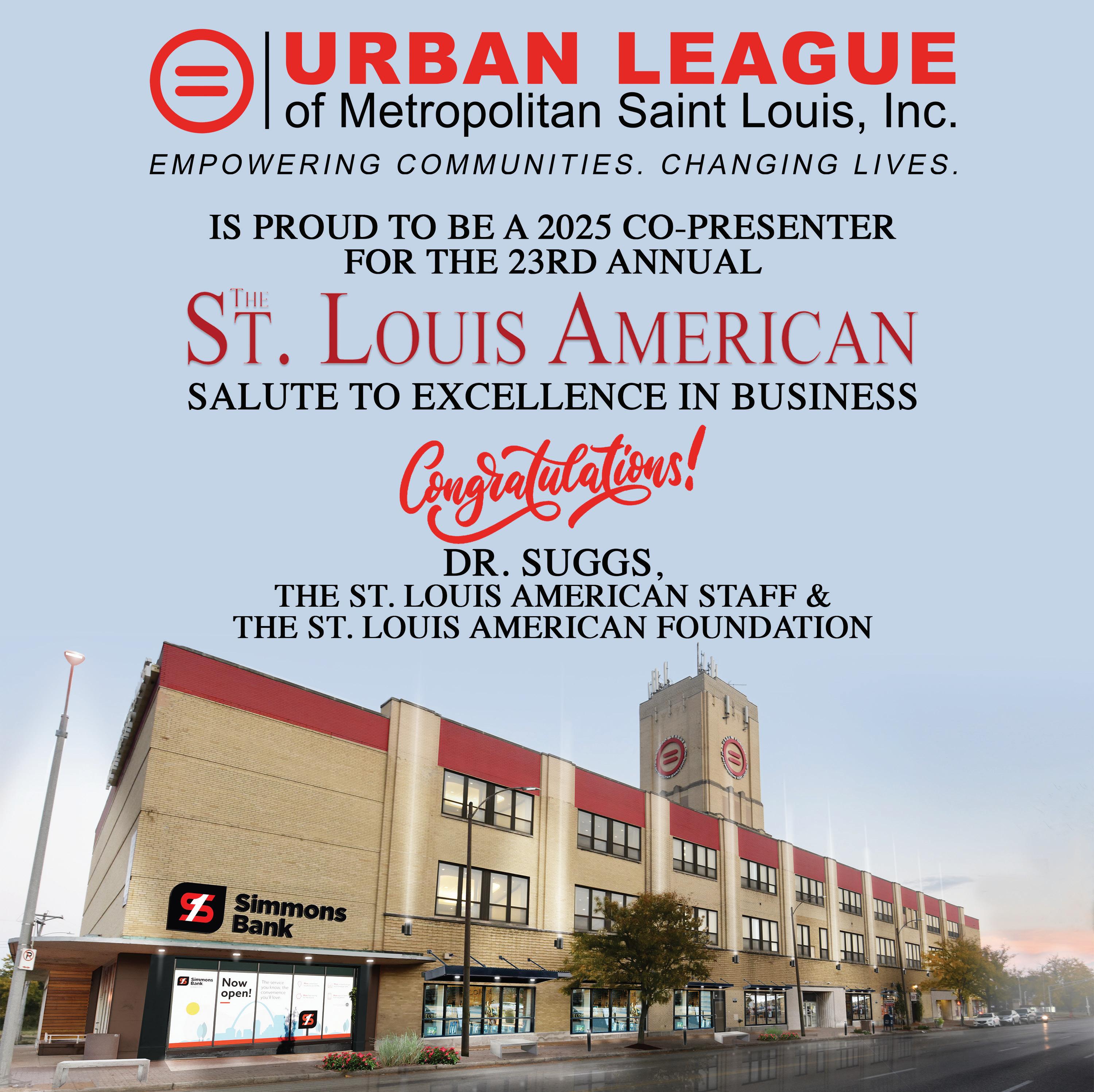
By Slyvester Brown Jr. St. Louis American
Chris Krehmeyer, CEO of the nonprofit Beyond Housing, wasn’t sure of what his future career would be when a young man – but he knew it would be based in an urban core.
Born in Staten Island, New York, Krehmeyer traveled the globe with his father, who was in the Coast Guard and his mother. His parents, native St. Louisans, moved back to the area when Krehmeyer was in the fourth grade. He was raised in University City and attended Washington University.
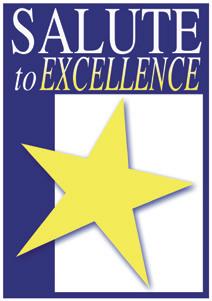
Krehmeyer wasn’t exactly sure of what he wanted to pursue so he took courses in business and law before taking an urban studies class that piqued his interest.
“I figured if I was going to do something for the rest of my life, I wanted it to be something I was interested in, so I got an undergraduate’s degree in urban studies,” Krehmeyer recalled.
The degree ultimately helped him land a position at Beyond Housing, a nationally recognized community development organization “dedicated to strengthening families and transforming ‘under-resourced’ communities to create a stronger, more equitable and prosperous St. Louis, once and for all,” according to its website.
He remembered his father’s reaction after he told him about his career choice
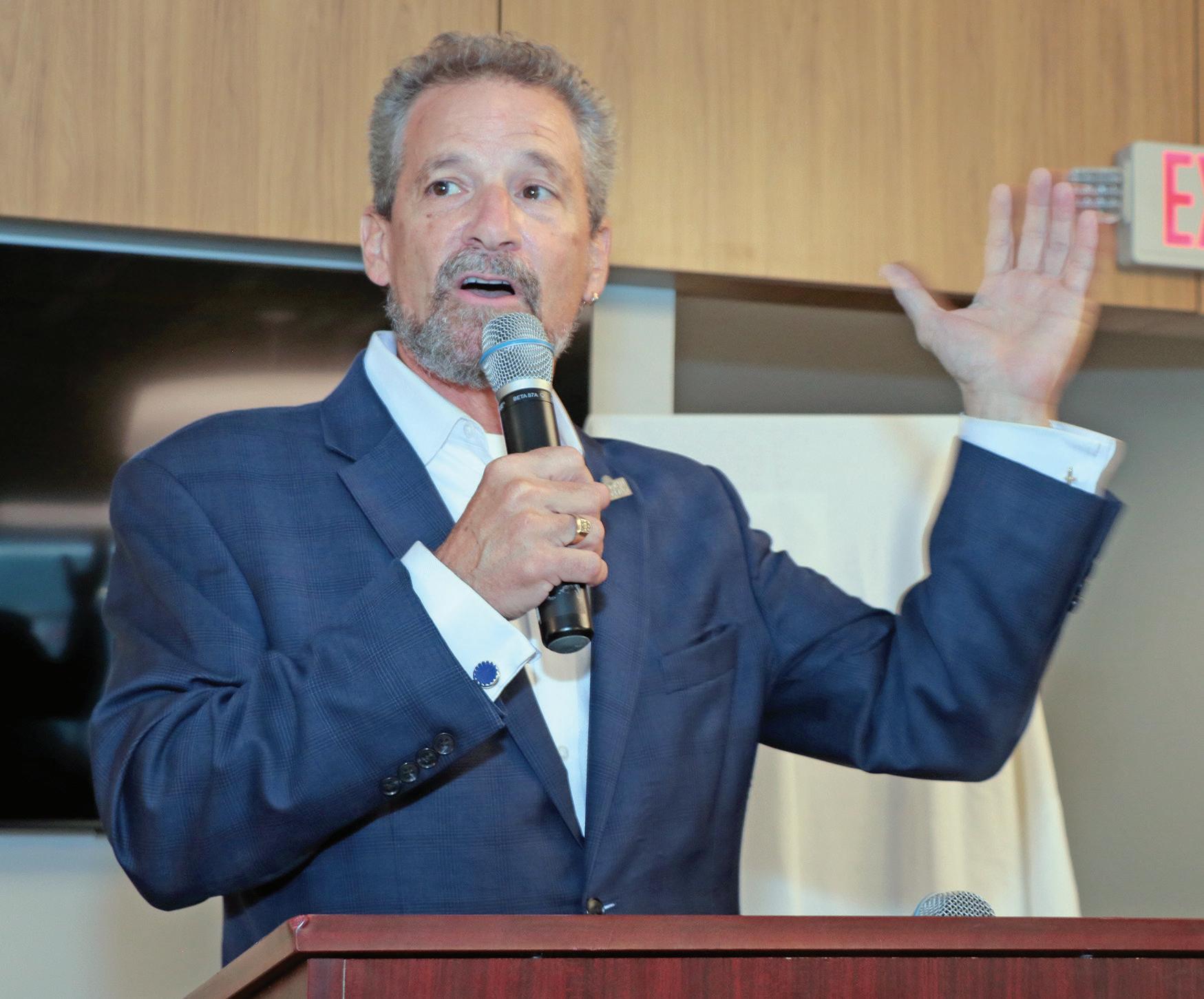
in urban planning.
“My dad asked, “What the hell is that and what kind of job are you going to get?”
While still a college student, Krehmeyer was awarded an internship in
the Jeff-Vander-Lou (JVL) neighborhood in North St. Louis. There he had the privilege to work with the late Macler Shepard, a champion of neighborhood organizing. He was impressed with Shepard’s work and inspired by his man-
tra: “From the house comes everything.” Confirming his father’s concern, Krehmeyer had trouble finding a job after graduating college. He gave no
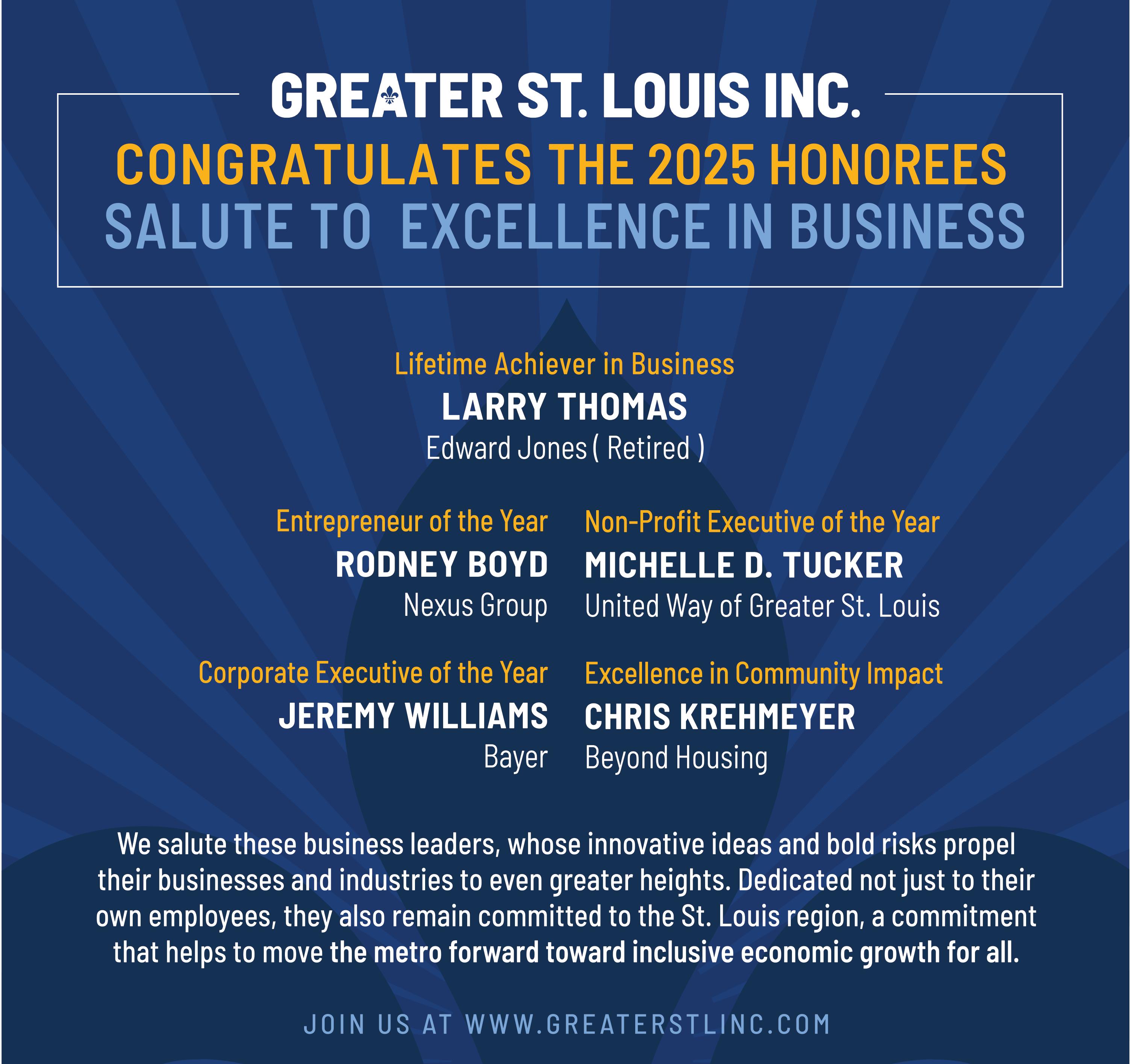
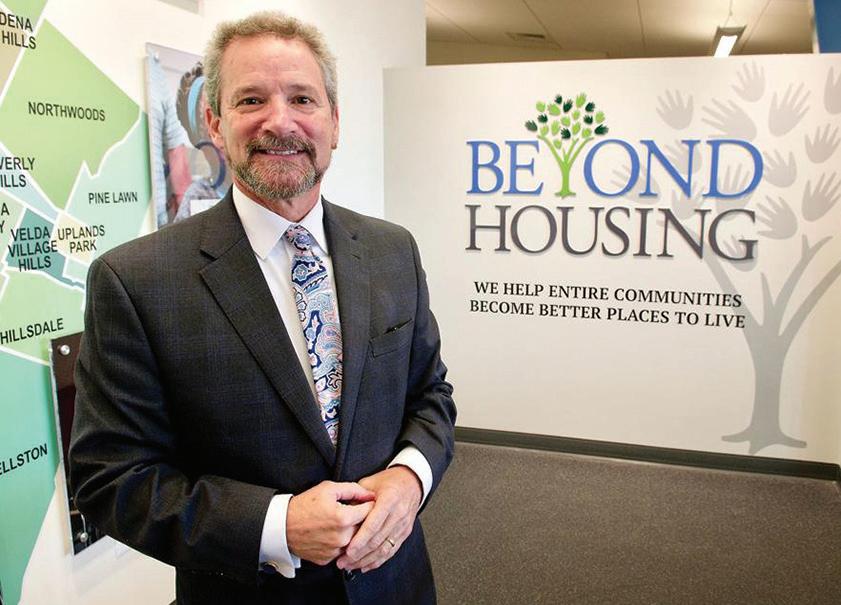
Continued from 5
thought to working in the nonprofit arena, thinking he was better suited for urban planning or city management-related work.
Although he had to endure his father’s “I told you so” look for a while, Krehmeyer landed a job with the St. Louis County Housing Authority in 1986. While there he learned about the work of the Ecumenical Housing Production Corporation (renamed Beyond Housing in 1997) which served families primarily living in housing units.
Krehmeyer said he was impressed with not only how the agency served families but how it “helped them move along in
the economic continuum.”
When he heard the organization was looking for a new director, he threw his hat in the ring even though he considered himself “terribly unqualified.”
But, Krehmeyer added, “I knew I had some skills that would be of value to the organization and the board gave me a chance.”
His hiring was the beginning of Beyond Housing’s evolution from scattered site-rental family housing in different areas of the region to getting more into “community work” in the late 1990s before expanding into the 2-I footprint in the 2000’s.
Krehmeyer credits the idea of transforming under-resourced communities to his upbringing in University City with its artificial but very real neighborhoods segregated by streets and income levels.
“I lived right across the street from U City High School, and I had friends who lived north of Olive and south of Delmar,” Krehmeyer said. “So, I was able to see how different communities operate and function. I knew there were certain parts of the region struggling so I became interested and fascinated with how we do a better job working within communities, having neighborhoods that work and giving families the opportunities to achieve their dreams.”
Beyond Housing works under the premise that “Thriving communities need an adequate supply of housing that people can afford, economic development to provide jobs and access to essential goods and services.”
His ongoing goals, Krehmeyer said, include trying to create a ‘place-based’ model with a strategy that can turn com-
Chris Krehmeyer, CEO of the non-profit Beyond Housing, will be honored with the “Excellence in Community Impact” award from the St. Louis American Foundation during its 23rd Annual Salute to Excellence in Business Awards and Networking Luncheon.
munities, with a host of problems such as disinvestment, completely around. “Can we change communities impacted by poverty and systemic racism; can we do that without gentrifying neighborhoods; can we listen to the voices of the people who live here to make their homes everything they want them to be; can we find the right resources, deliver the right partners to turn the place around and show this is the power of what’s possible.”
Krehmeyer responded gracefully to the news that he’ll receive the “Excellence in Community Impact” award from the St. Louis American.
“It’s an absolute honor. I’m humbled to receive such great acknowledgement with other folks who are being recognized. It’s just a great recognition.”
Sylvester Brown Jr. is the Deaconess Foundation Community Advocacy Fellow.

By Alvin A. Reid St. Louis American
Few non-profit leaders in the St. Louis region, or nation, have guided their organizations in the historic fashion of Michelle Tucker, United Way of Greater St. Louis president and CEO.
By providing funding and training resources to over 160 local nonprofit partner agencies, the United Way addresses the needs of 43% of all households in the region that do not have the monthly income to meet their basic needs.

United Way assists more than one million people each year throughout 16 counties in Missouri and Illinois, which is 1 in 3 residents in its service area.
Tucker’s leadership helped the 2024 United Way Campaign raise nearly $58 million during the 2024 community campaign, and the organization surpassed the $3 billion milestone this year. The campaign’s $58 million was a major part of the United Way’s $67 million investment last year.
“Through United Way, our staff, donors and volunteers have had a profound impact on the lives of millions of local individuals and families, raising nearly $3 billion overall to invest back into these communities we call home,” says Tucker.
“Being recognized as the 2025 Nonprofit Executive of the Year by the St. Louis American Charitable Foundation is an absolute honor. The
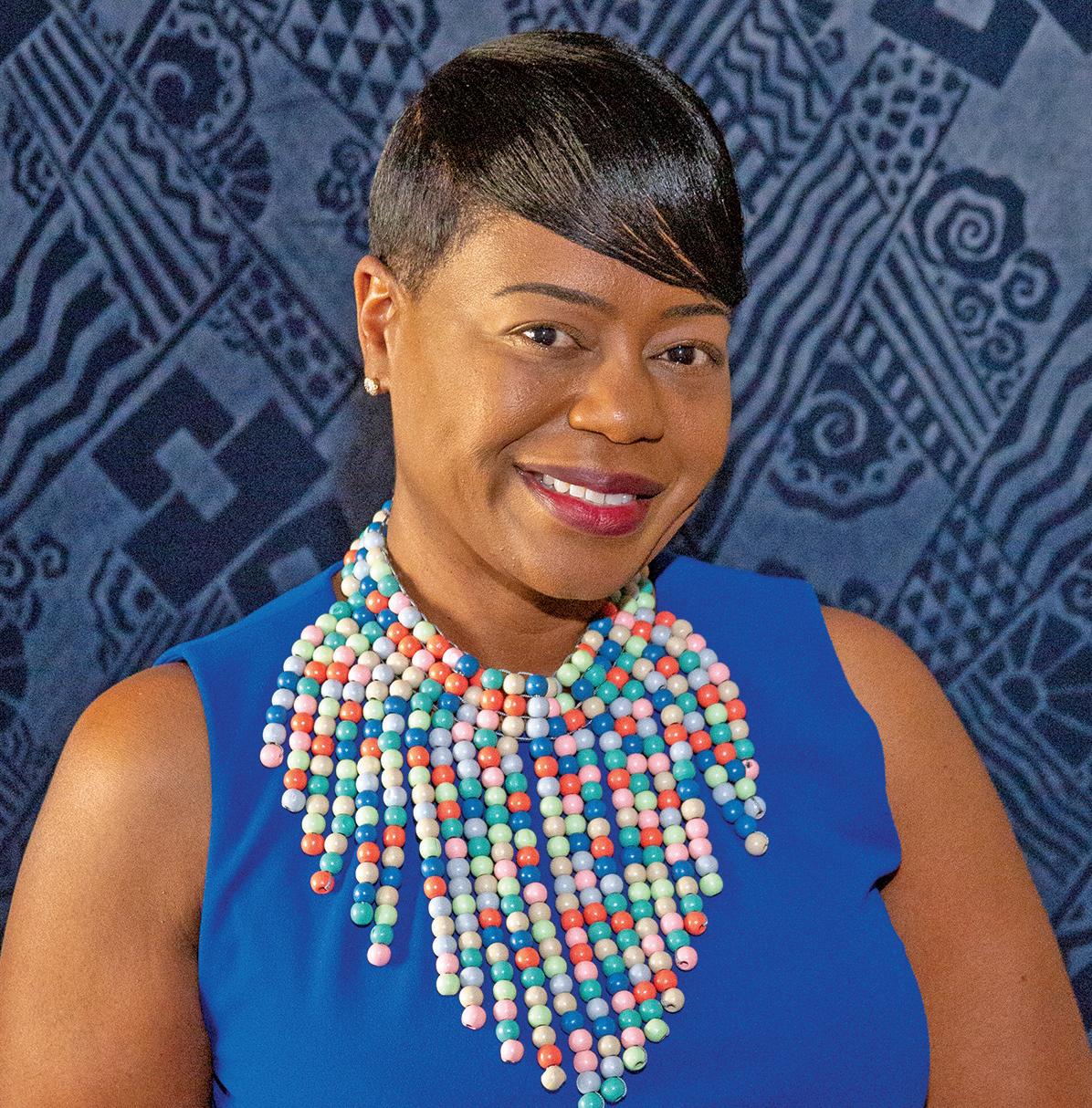
award is not simply a personal one, but one that is truly a testament to the hard work and dedication of every single person involved in our mission,” Tucker told The American.
“Receiving this award serves as a reminder of the vital role United Way of Greater St. Louis plays by serving as a catalyst for the nonprofit sector and for countless neighbors helped across our
region. It makes me proud to know that together we are making a collective difference for so many. I consider this award one of the highest compliments from our community.”
Tucker also thanked St. Louis American Foundation founder and board member Donald M. Suggs, who also serves as American publisher and executive editor.
“Dr. Suggs’ commitment to shining a spotlight on the Black community is unmatched. His ability to champion those making a difference and doing extraordinary things shares equal space with raising attention around those in need and ways to help. His influence on me has mainly been through witnessing him
See TUCKER, page 11
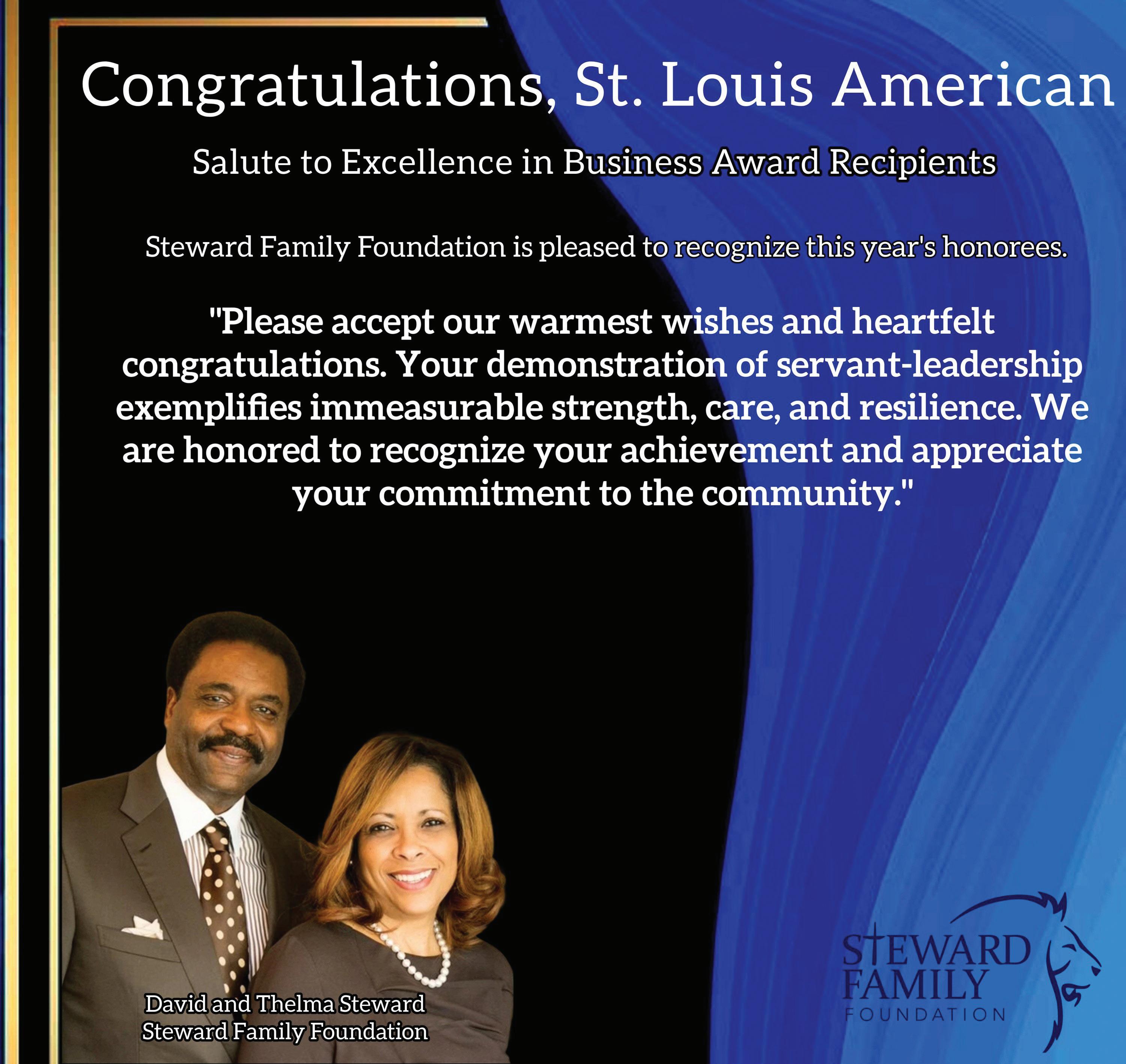
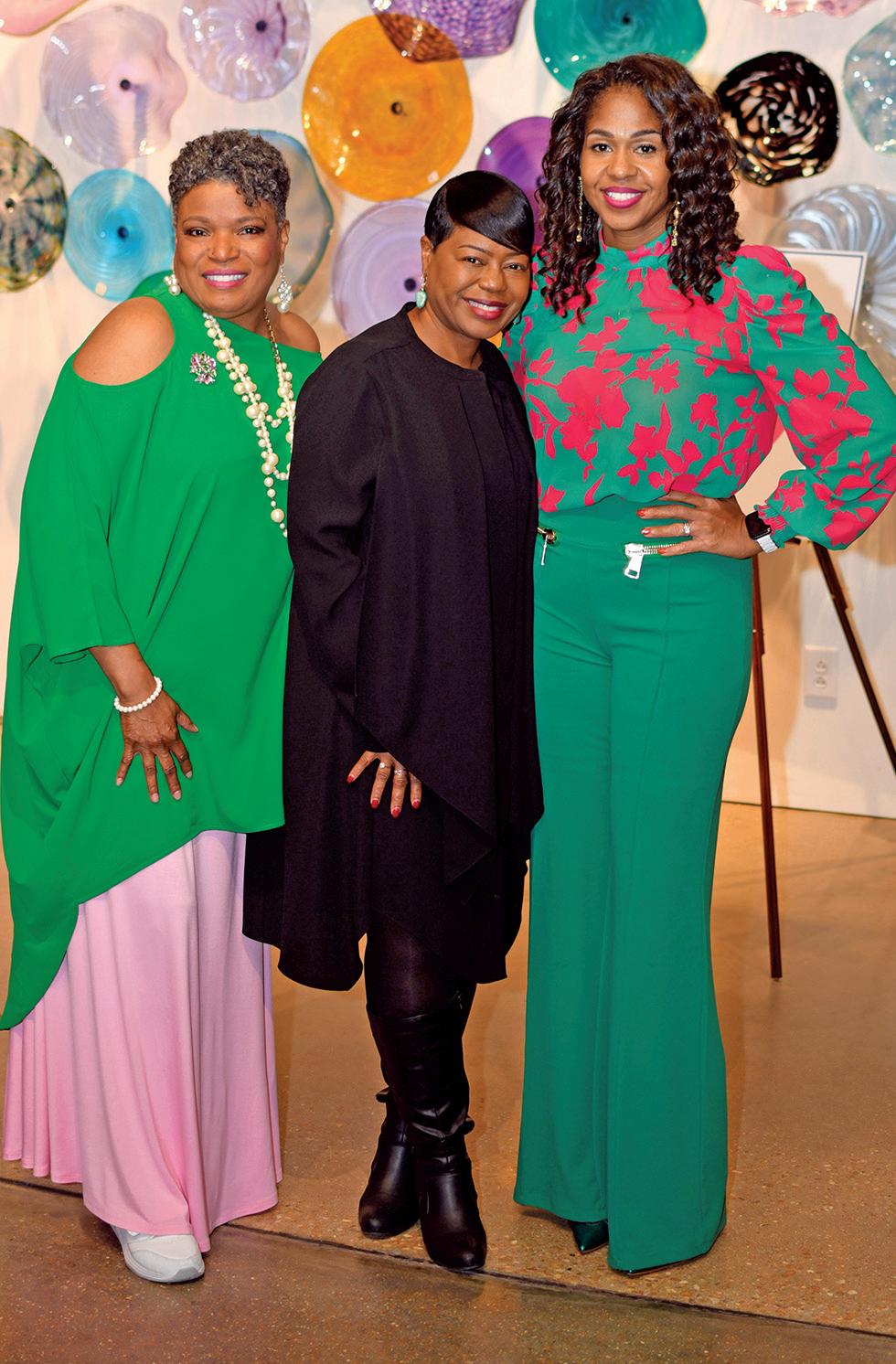
continued from page 9
model great leadership and finding ways to get more involved while inspiring others to do the same. It’s quite contagious,” said Tuccker.
Dr. Suggs is truly a trailblazer in St. Louis when it comes to United Way and Black Philanthropy. Three decades ago, he was among a group of extraordinary black professionals who embarked on a
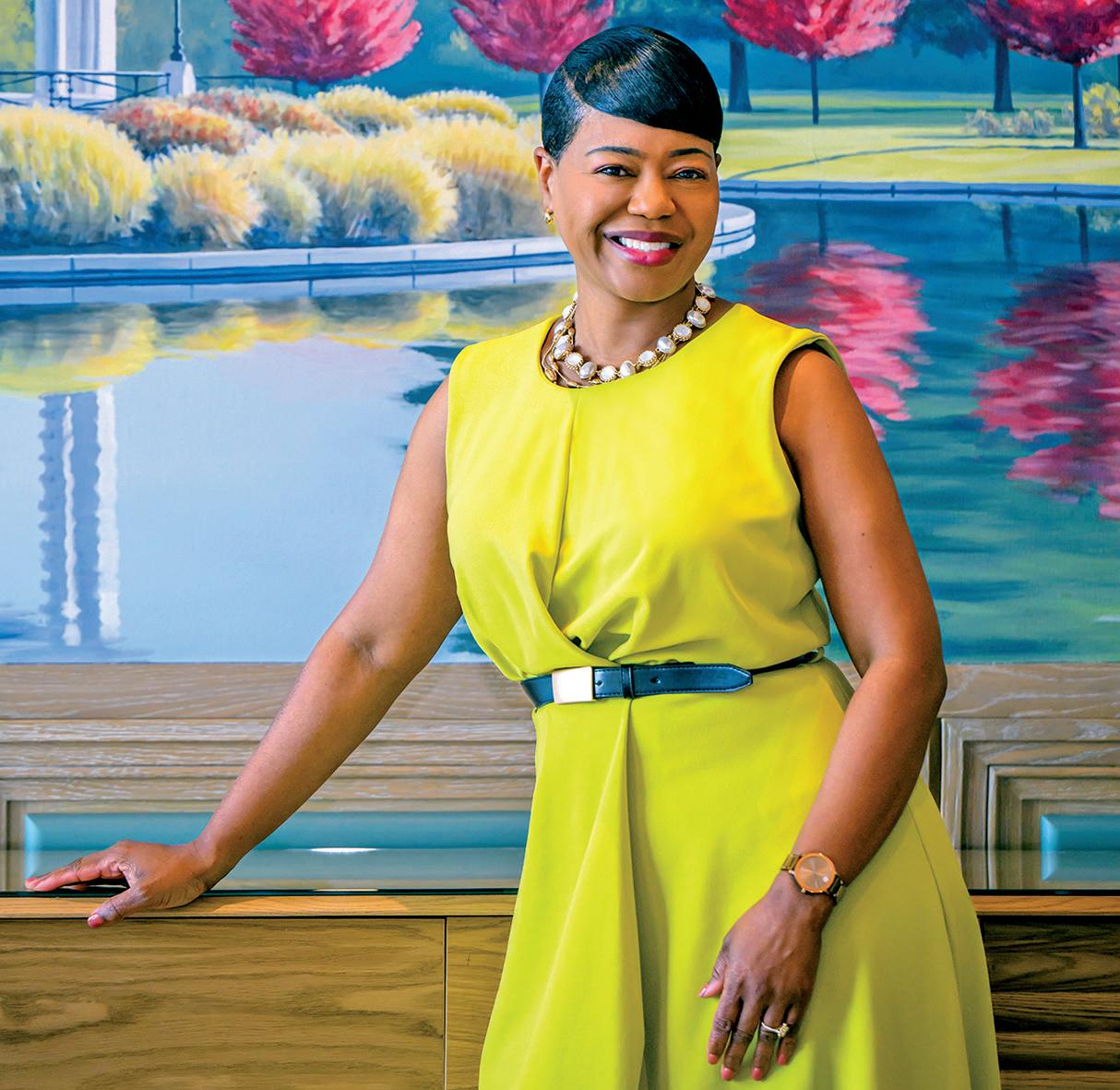
Francella Jackson, Michelle Tucker and Arica Harris joined Black Greeks celebrating the United Way of Greater St. Louis Charmaine Chapman Society Divine 9 campaign at The Three Degree Glass Factory. Jackson and Harris were 2022 co-chairs and Tucker is United Way president and CEO.
journey to empower neighbors through collective giving by launching the African American Giving Initiative, later named the Charmaine Chapman Leadership Giving Society (CCS).
“Our United Way CCS continues to help fuel our efforts to provide vital resources to those in need for over 30 years comprised of over 500 black leadership donors at the $1,000 level or greater annually. CCS members have donated over $90 million and growing to the local community over the lifetime of the initiative.”
Education, Tucker explains, was the key to her success and the same is true for young people throughout the region.
“Make certain education and skill development are both at the top of your priority list. Whether it’s through traditional college, vocational training, or developing knowledge on your own. Broadening your learning opportunities and perspective will help place you in the best position to open doors,” Tucker advises.
Tucker’s service is not limited to her own non-profit organization. She
is a dedicated civic and nonprofit volunteer, and has served on the boards of Downtown STL, Inc., the Urban League of Metropolitan St. Louis, Christian Hospital, FOCUS St. Louis and many more.
While she is a non-profit dynamo now, she entered a new world when she retired from Bank of America after a 20-year career there to become Epworth Children & Family Services president & CEO and has served as United Way president and CEO since 2019.



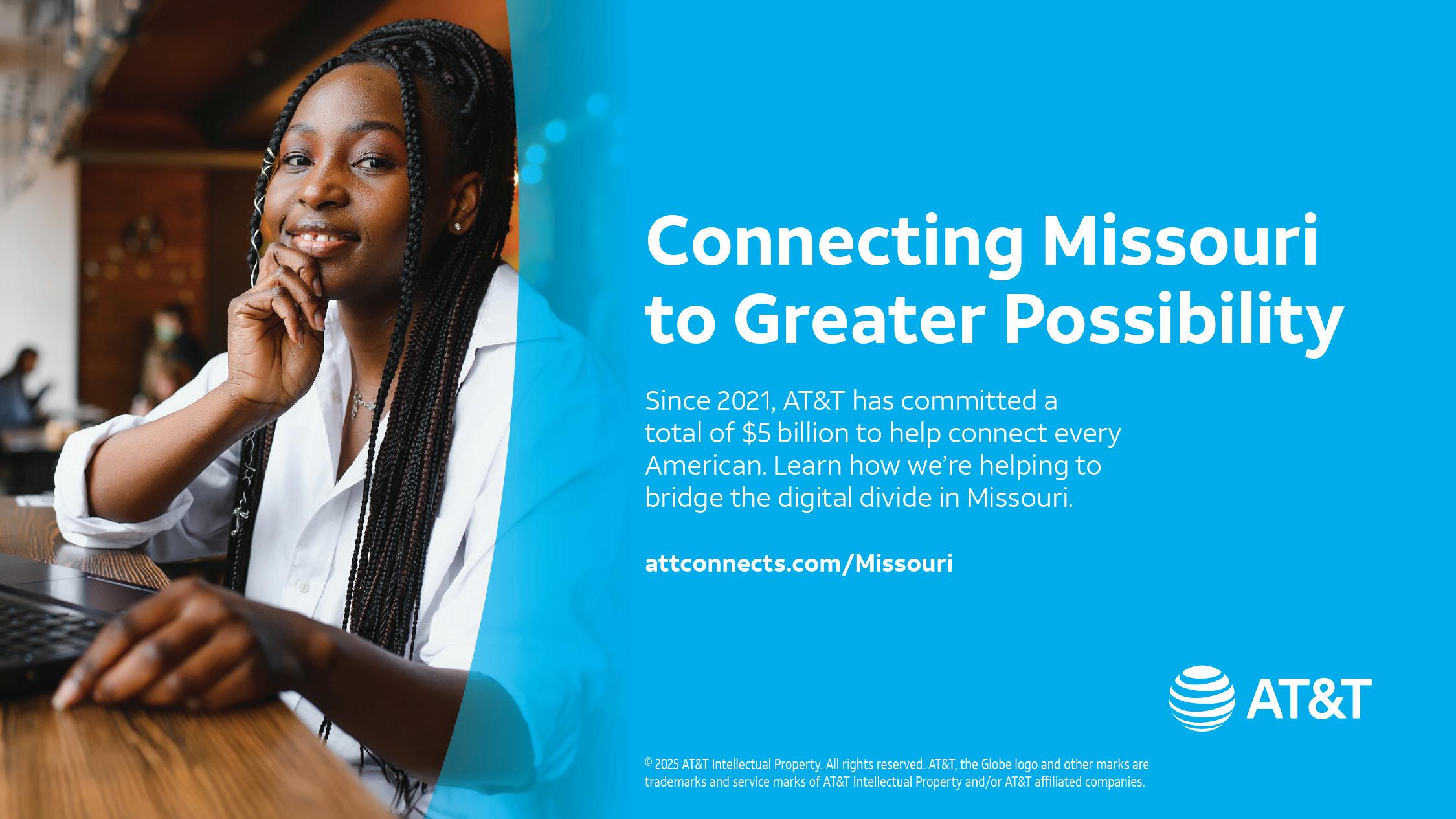
By Sylvester Brown Jr. St. Louis American
When Larry Thomas was honored in 2019 as the Washington University Dean’s Medalist, he offered some prophetic words during his acceptance speech.
“We must continue to make sure that we enroll students here from all economic levels, including those who don’t have the financial means to attend,” he said.
Thomas, a Washington University alum, said the prestigious school “gave us something we could walk away with, other than just a degree, and we should all give as much back as we possibly can.”

He retired in 2021 after working almost 50 years with Edward Jones and has continued serving his community and “giving back” whenever and wherever he can.
Thomas, who rose to become one of Edward Jones’ first minority partners, began as an intern in 1977 after graduation.
A scholarship made his education at WashU possible, something he will never forget.
“The scholarship was certainly important for me, because I wouldn’t have been able to attend a private university otherwise,” he said.
Thomas began supporting scholarships in 1986. He has established the Lawrence

E. Thomas Scholarship, the Wesley Thomas Scholarship and the Lawrence E. Thomas/Edward Jones and Company Scholarship.
Thomas is widely respected both for his pioneering work at Edward Jones, his philanthropy and multiple roles as board member or board chair with
civic institutions including the United Way’s Charmaine Chapman Society, Washington University’s “Make Way” initiative, the St. Louis Zoo, Forest Park Forever and Provident Behavioral Health. He has always found time to be involved in supporting his community and still leads a productive life.
“Retirement, for me, means I retired from Edward Jones,” he stated, adding: “But there’s plenty life ahead to do other things.”
Thomas is an accomplished saxophonist and an avid classic car collector. Some of the “other things” on the retiree’s “todo list,” include his continued service with nonprofits, playing his saxophone more, building a music studio and recording room just to “jam with my pals,” he said.
He is fascinated with cars, and he drives either his vintage Porsche, BMW, Bentley, Lamborghinis or one of the many cars from his impressive luxury car collection.
Thomas has come a long way from his roots in Vicksburg, Mississippi. He recalled, as a child, the signs of deeply segregated life in the small town: Separate water fountains for Black people and whites; the Woolworth lunch counter where Black people were forbidden to sit or eat, and buses were remanded to sit in the back rows.
In fact, he recalled “a teaching moment” when he, his aunt and his younger sister, Rita, boarded a segregated bus. Thomas and his aunt instinctively sat in the back of the bus, but his sister chose a seat in the front.
“I was old enough to know about segregation, So I said to my aunt, ‘Rita is in front of the bus. She’s going to get in trouble.” His aunt responded curtly:
See THOMAS, page 15
continued from page 14
“Don’t say anything to her. Let her sit and nobody better say anything to us.”
Thomas said he learned “to get past it (racism), get through it and not let it be a detriment” to his life.
He found salvation through music. His godmother was a pianist and music teacher and at the age of six, she had Thomas playing the flute. He later picked up the clarinet and a few other instruments and mastered multiple musical genres before landing on the saxophone.
Thomas was determined to make music his route out of the South. He played with segregated and integrated bands throughout his high school years. But the summer before his senior year of high school, he and his all-Black bandmembers landed a coveted spot as one of the band delegations invited to perform at the Elks National Convention in St. Louis. They were housed at Washington University during their stay in the city.
Impressed with the university, Thomas enrolled the following fall with the intention of studying pharmacology.
“I realized after a couple years, it wasn’t my cup of tea,” he recalled.
Along with music, Thomas was also attracted to math and science, so he transferred to Olin Business School to study business. At Olin he enrolled in an internship class. His professor at the time, George Hempel, directed him to apply to three companies. Edward Jones was the one that offered him a job as an intern.
There were very few African Americans in professional positions at Edward Jones in the late 1970s. Thomas rose through the ranks, first on the trading floor, then as an equity research analyst before entering the company’s capital markets division before his promotion as market development leader overseeing “13 states from Virginia to Main plus the district of Columbia.”
Thomas generously donates his time, resources and money to Washington University. “It’s a form of “payback,” he said, which he also told WashU magazine two years ago.
“Naturally, I have a strong investment in Washington University. My advisers not only knew my potential, but they also threw their weight behind me,” Thomas said.
“I want more students to discover the resources, networks and social capital at their fingertips. I want all of them to

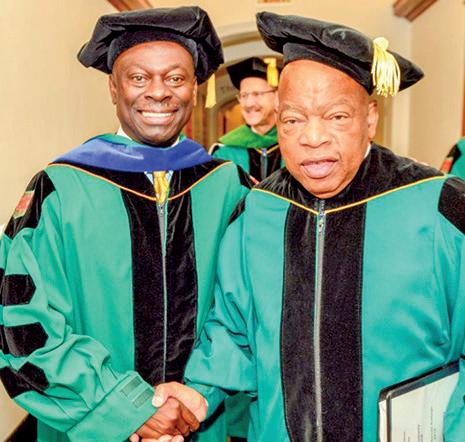
Washington University alum Larry Thomas with the late U.S. Congressman and civil rights icon John R. Lewis following Lewis’ 2016 Commencement address at Washington University in St. Louis.
realize the empowering possibility of this place.”
One of his favorite WashU initiatives is “Make Way,” a support-building internship and career development program
Larry Thomas is widely respected both for his pioneering work at Edward Jones and continued service as board member or chair with civic institutions including Forest Park Forever, the United Way’s Charmaine Chapman Society, Washington University’s “Make Way” initiative, and the St. Louis Zoo.
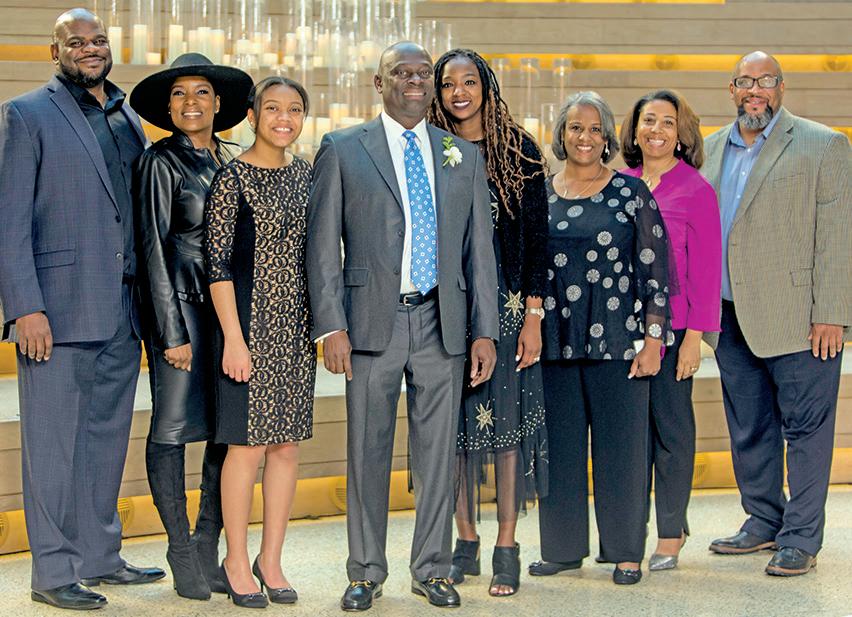
Larry Thomas with friends and family
geared to help cultivate student health and well-being.
“Make Way helps students come to WashU. It also ensures that they truly connect as I did,” Thomas told the mag-
azine. “Not all students arrive equipped to seek resources or ask for help. It’s not only about tuition, room, and board. We want our students to be able to engage fully.”

By Sylvester Brown Jr. St. Louis American
Last summer, the Urban League of Metropolitan St. Louis and partners Vested Urban Farms, and Fresh Harvest 365 celebrated the opening of the George Washington Carver Urban Farming project.
The 6,800 square foot greenhouse has continued to grow and will ultimately include a total of 200 food towers. The resulting produce will be sold to St. Louis families at local markets.

Instrumental in the groundbreaking accomplishment was a statebacked grant, which Rodney Boyd, founder and partner with the Nexus Group, a full-service government relations and lobbying firm, helped secure.
Boyd’s assistance wasn’t going to just any neighborhood project – he grew up near the Urban League headquarters at Page and Dr. Martin Luther King.
“I lived not very far from here as a kid,” he said.
“I know the importance of fresh produce and healthy nutrition.”
From the age of eight until he was sixteen, Boyd worked at the “House of Good Care,” a popular shoeshine parlor on the corner of Marcus and St. Louis Avenues. It was a hangout where the city’s Black who’s-who (politicians, preachers, lawyers, entrepreneurs and hustlers) hung out, swapped tall tales and conducted business all while having their shoes expertly shined.
Customers of the parlor during the late 1970s and early ‘80s, Boyd remembers,
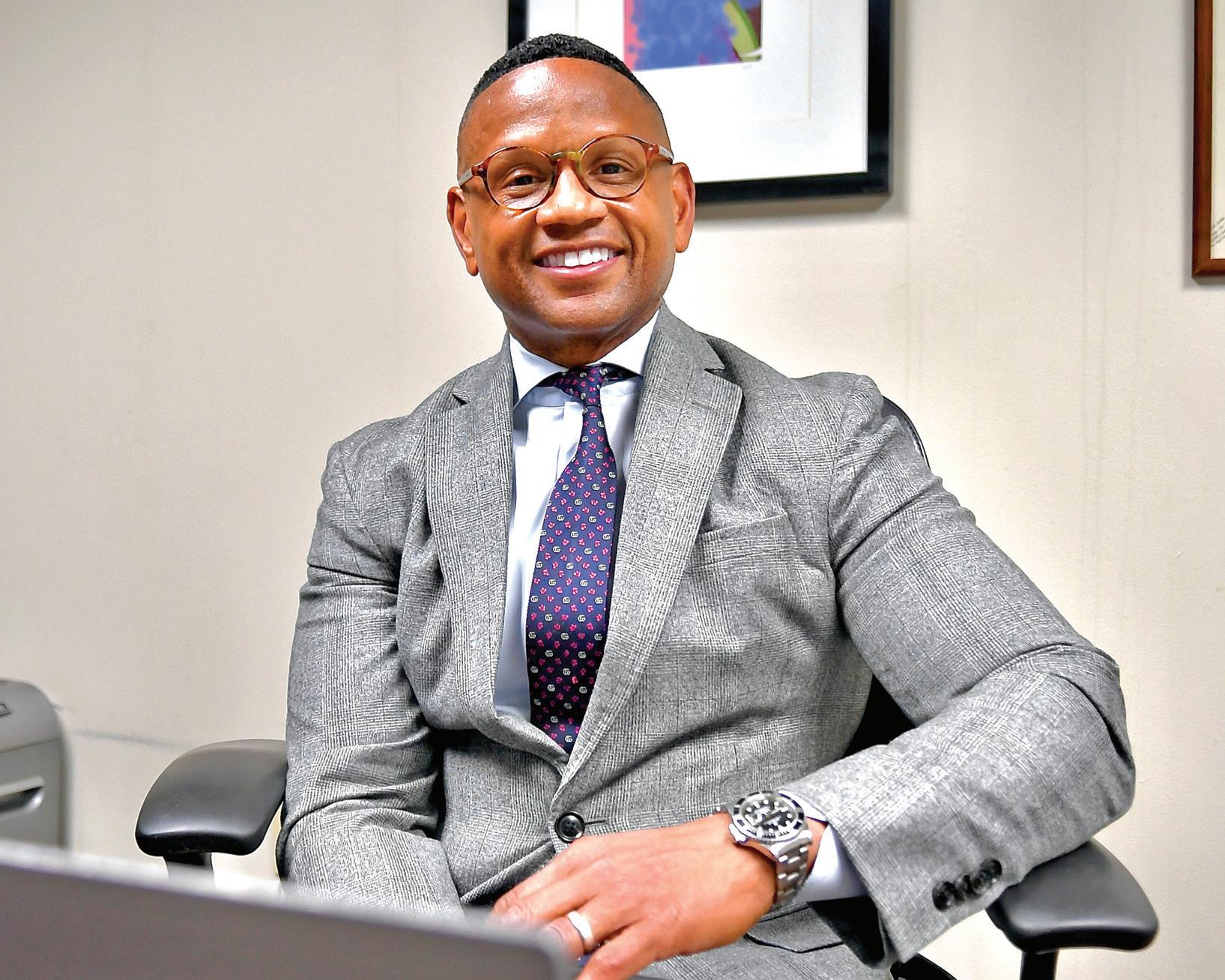
included JB “Jet” Banks (the late former state senator), William (Bill) Clay Sr. (former congressman), Wayman Smith (the late Anheuser Bush Executive), Michael and Steven Roberts (entrepreneurs and politicians) and many local notables.
Not only was young Boyd exposed to
the social and political events of the city, but he also said the seeds of entrepreneurism were planted within him as well.
“I knew, from the age of 8, 9 or 10, that I could-on any given day in the ‘70s-walk out of that place with $50to-$100 dollars in my pocket, then go home where my grandparents were just
overjoyed because I was able to generate more money than some of the older guys. That was my first exposure to entrepreneurism.”
By the time he was in high school,
See BOYD, page 19

Continued from page 17
Boyd had chosen his life’s vocation.
“I remember when I was a freshman in high school and the career counselor asked me what I wanted to be. There was no pause, no hesitation. I said, ‘I want to be a lawyer but the kind who works in government.’”
From his experience with high profile customers at the shoeshine parlor-especially politicians-Boyd surmised that government shaped and influenced people’s lives. “There’s so many things I think are wrong that if I can get into that space, I think I can make a difference,” he told the school counselor. And so, he pursued the path of law.
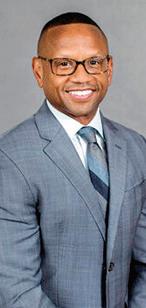
After graduating from Cleveland ROTC High School, he enrolled at Lincoln University in Jefferson City. In his senior year at Lincoln, he asked a professor how he could get “real experience in politics?” The professor arranged for him to have an internship at the state capitol. He wound up becoming an intern for the entire Black Caucus.
At the end of his junior year at Lincoln, Boyd enrolled at the University of Missouri in Columbia where he studied law and prepared for the LSAT (law school admission test). He graduated with a law degree in 1996.
Boyd had already served as a legislative assistant in the Missouri General Assembly and clerk for the Missouri Supreme Court. Before he graduated, another colleague, who had joined the city’s first African American mayor, Mayor Freeman R. Bosley Jr.’s staff as city attorney invited him to be his intern. After Bosley lost to incoming Mayor Clarence Harmon, Boyd joined his staff as an assistant city counselor, assigned to the Prosecution Division.

Rodney Boyd delivered the 2020 Lincoln University Founders’ Day keynote address in Jefferson City. Boyd, a 1993 LU graduate, is a co-founder of Nexus Group, a full-service government affairs firm headquartered in Jefferson City.
Harmon wasn’t particularly fond of wrangling with Jefferson City politicians. Because he had some experience, Boyd was chosen to lobby for the mayor’s administration.
“That’s when my career as a lobbyist was born,” Boyd stated. “There I was a lawyer and a young, virgin lobbyist and I realized this is something I would really like to do.”
Boyd opened his own legal lobbying firm and started racking up numerous clients in need of strategic governmental relationships with lawmakers and state agencies.
Boyd procured contracts for city and state governments, helped get more
than 70 legislative proposals passed in Missouri and Illinois, helped with the creation of new tax credit policies, and assisted in the creation of new law enforcement statutes and more.
In 2006, he joined the firm of Sonnenschein Nath & Rosenthal LLP, (now Dentons US LLP) based in Chicago with offices in St. Louis doing lobbying work. To grow his own practice, in 2018, Boyd cofounded and launched the minority-owned Nexus Group.
Boyd has had an illustrious career. He
said his major mission has been to make a difference and leverage opportunities for those “still stuck in North St. Louis.”
“The one thing I realized is that someone is always listening, always,” Boyd said. “So, be very prudent about what you say and how you say it. In every environment I’m in, I carry myself in a way that when I say things, I’m not going to be ashamed of later and I only say things that I sincerely plan to accomplish.”
Sylvester Brown Jr. is the Deaconess Foundation Community Advocacy Fellow.

By Alvin A. Reid
Jeremy Williams says he has always been interested in science, and his internationally acclaimed knowledge is essential in Bayer’s development of Artificial Intelligence technology used in the agricultural sector.
Bayer is leveraging AI technology and expertise to quicken the development of seeds, traits and crop protection as well as to provide cloud-based solutions for the food value chain.

“AI is a core technology in powering the digital transformation of agriculture, which helps tackle climate change and ensure global food security,” Williams, head of Climate LLC, Digital Farming and Commercial Ecosystems for the Crop Science division of Bayer, said of his firm’s advancement of AI.
“Science has been a part of Williams’ life since childhood, leading him to tell the St. Louis American, “I’ve been a science geek as long as I can remember.”
Williams came to the United Sates as an immigrant of African descent from Georgetown, Guyana to attend Swarthmore College, where he earned a Bachelor of Arts in Biochemistry and French.
His talent could have led him in many directions, and fate sent him to St. Louis where he attended Washington University and earned a Ph.D. in Molecular Biophysics in 1999.
Williams said he gained “broader exposure” at Wash U. and through “a lucky coincidence,” was a co-founder sci-
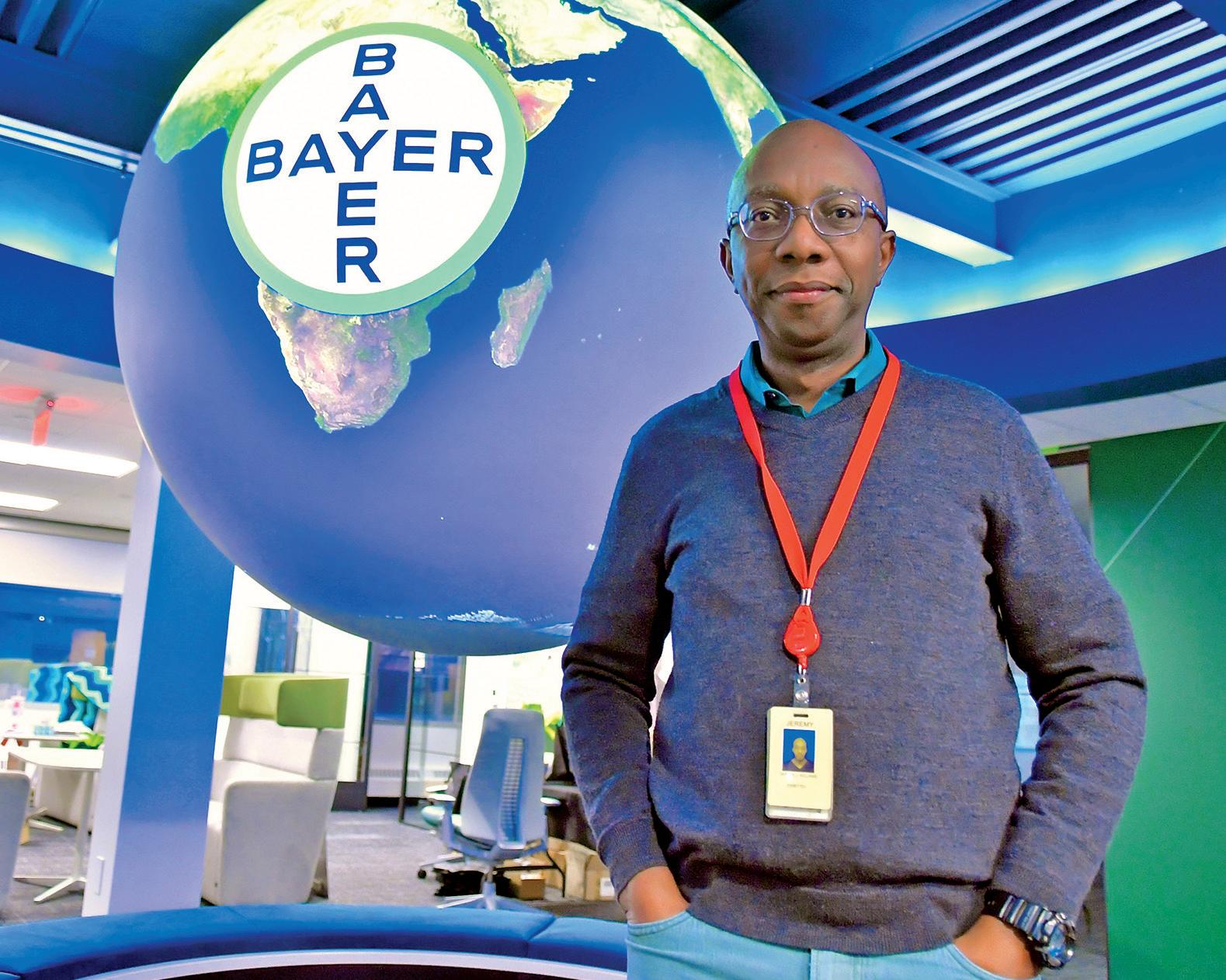
entist of the start-up company Divergence with friends from the prestigious university.
He held scientific research and leadership roles at Divergence, including vice president of discovery research. Williams is a co-inventor of several patents held by Divergence and its collaborators, and he was named a Senior Monsanto Fellow in
Monsanto, was later acquired by Bayer in 2011.
Williams took his 20 years of diverse biotechnology and agrochemical R&D experience to Bayer Crop Science in 2018, after having served in several research and development leadership roles at Monsanto including as head of
chemistry research and development. He now serves as Head of Climate LLC, Digital Farming and Commercial Ecosystems for the Crop Science division of Bayer, where he leads a team that develops digital tools “to help unlock the next wave of agricultural innovations.”
See WILLIAMS, page 23
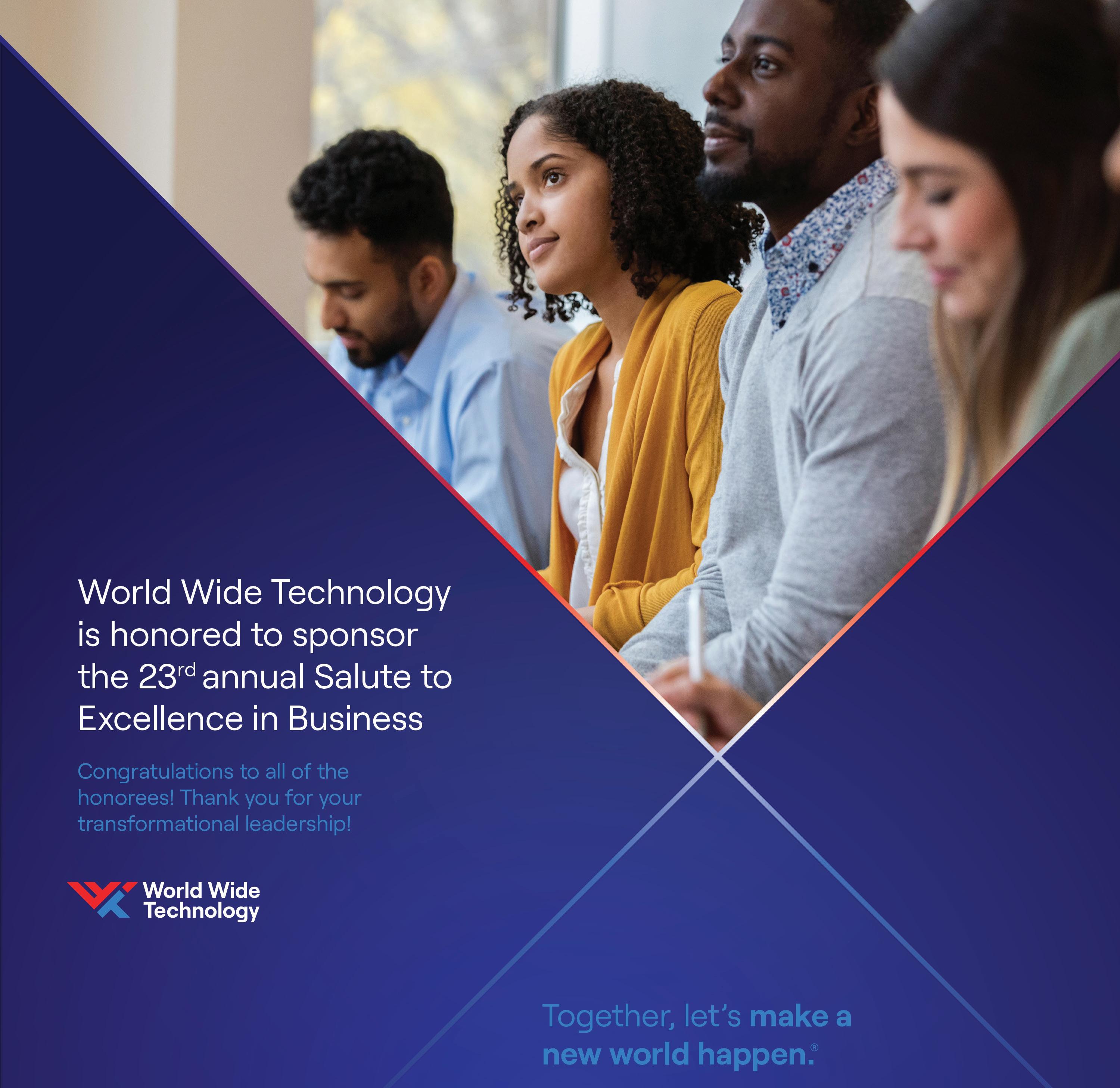
Continued from page 21
Williams, who is also a member of the Crop Science Executive Leadership Team, will receive the St. Louis American Foundation Corporate Executive of the Year award on Feb. 20, 2025, during the 23rd Annual Salute To Excellence in Business Networking and Awards Luncheon at the Ritz-Carlton St. Louis.
“This was a surprise,” said Williams.
“Those who know me well know I just like to get the work done.”
Upon learning of his award, Williams posted on Instagram, “It is a great honor, and I am truly humbled. This award is a testament to the dedication, leadership, and impact that we strive to create in our industries and communities.”
“A huge thank you to my family, mentors, colleagues and friends for your unwavering support throughout my journey. I look forward to celebrating this moment with all of you.”
Williams said many friends, co-workers and fellow professionals have contacted him with congratulations.
“So many people have had such positive reaction,” he said.
Williams, a staunch supporter of diversity in his and corporate workplaces, said his honor is important for what is portrayed.
“It lets people see what is possible, regardless of their background,” he said.
“It can help people dream big and have successful careers. Don’t let the fact that you might be highly underrepresented in a field limit your ambition.
“I’ve been one of a small number many times.”
Williams said “if you do the work, a mentor or someone else will see that you someone they should invest in.”
He endorses “following dreams,” down a path of the future.
“I’ve always followed my passion for science – but also the passion to apply science,” he said.
Before advancing to his current position, Williams served as a member of the Research & Development Leadership Team as senior vice president, head of Plant Biotechnology for the Crop Science division of Bayer.
In that role, he led a global team to “enable a robust plant biotechnology pipeline developing highly effective solutions to strengthen a plant’s resistance to insects, diseases and other environmental stresses.”

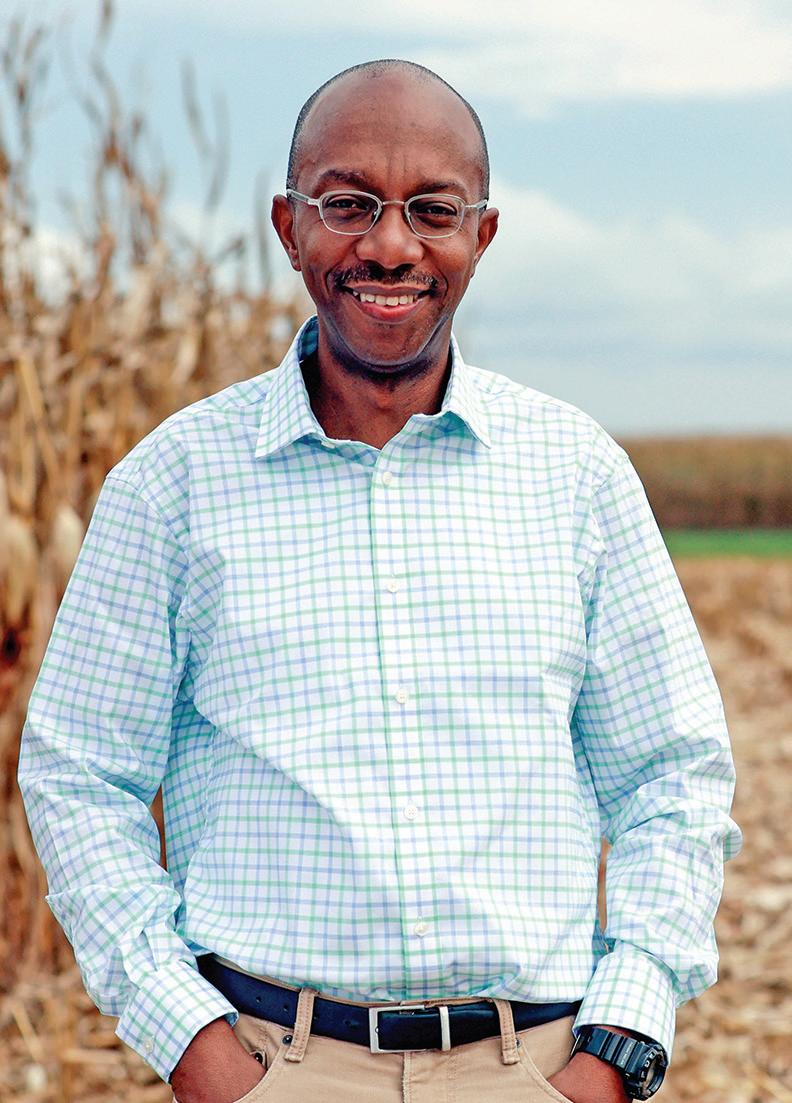
He says he is also passionate about inclusion and diversity and has served as the president of the African Americans in Monsanto business resource network and as a sponsor for the WiSE Guys ally network.
In July 2024, Williams posted on Instagram, “Being the lone voice means almost always carrying an additional
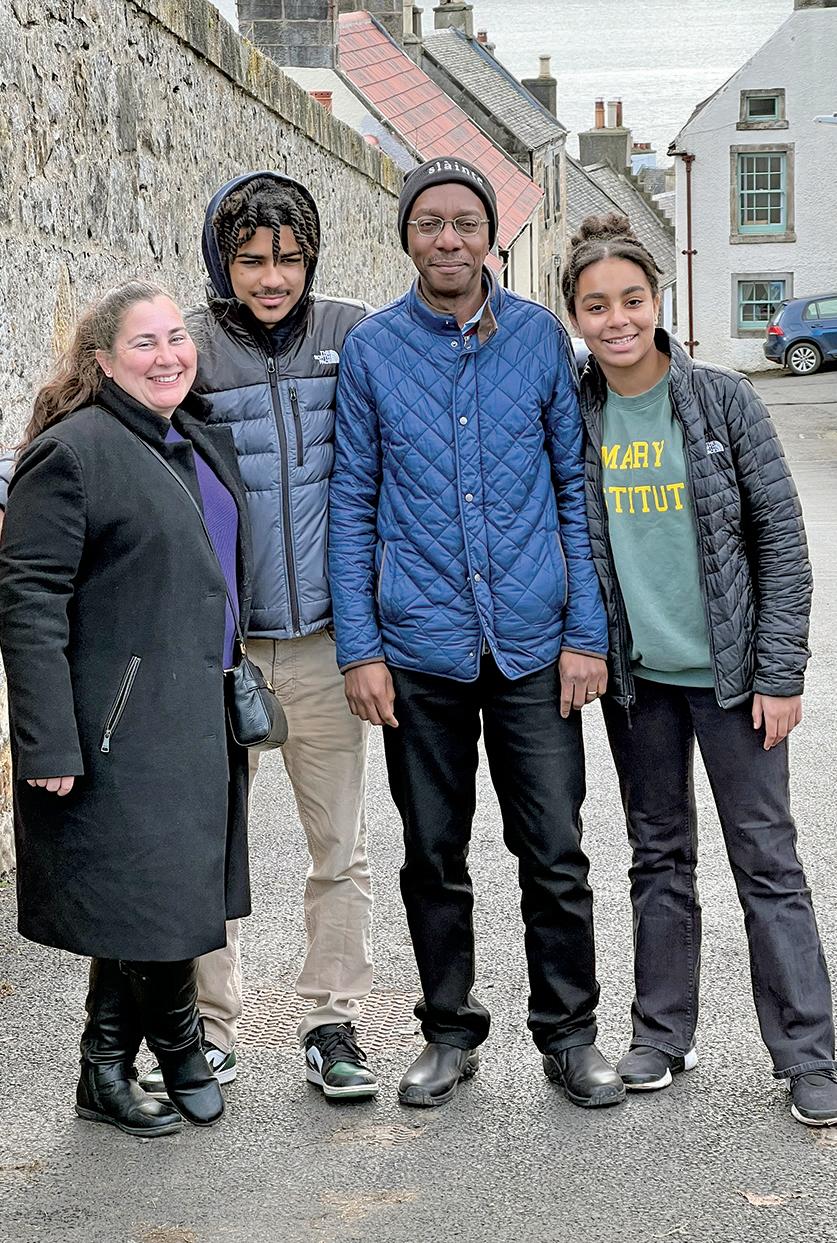
left:
Top, right: Jeremy Williams with his wife Rachel Presti, and two kids, Deryck and Isabelle, on vacation in Scotland.
Bottom, left: Jeremy Williams
invisible load that one needs to manage carefully if one is to remain effective and stay grounded.”
“I’m very fortunate to work for a company like Bayer, which remains committed to diversity, equity and inclusion to help us be a stronger, more innovative and competitive company.
He is currently a member of the
GROW Cabinet, and a United Way of Greater St. Louis board member. Williams lives in St. Louis, with his wife Rachel Presti and their children Deryck and Isabelle. His hobbies include, of course, science fiction & fantasy. He is also a wine connoisseur and is a taekwondo devotee. He and his family love to travel for vacation.




2023 – Arnold Donald (Retired CEO Carnival Corporation)
– Michael Kennedy Sr. (Founder & Chairman, KAI Enterprises)
2024 - Steven Harris (RubinBrown)
2023 - Orvin Kimbrough (Midwest BankCentre)
2019 - Bill Bradley (Anheuser Busch)
2018 - Vanessa Cooksey (Wells Fargo)
2017 - Melva Peete (SAK Construction)
2016 - Willie Epps (Edward Jones)
2015 - Craig Fowler (Bank of America)
2014 - Vince Bennett (McCormack Baron)
2013 - Rodney Gee (Edward Jones)
2012 - Pamela Wall Dover (Boeing)
2011 - Larry Thomas (Edward Jones)
2010 - June Fowler (BJC Health Care)
2009 - Ann Marr (World Wide Technology)
2008 - Keith Williamson (Centene Corp.)
2007 - Patricia Smith-Thurman (MasterCard)
2006 - Mark Darrell (Laclede Gas)
2005 - Norma Clayton (Boeing)
2004 - Ed Adams (Enterprise Rent-A-Car)
2003 - Deborah Patterson (Monsanto)
2002 - Marquita Wiley (Bank of America)
2001 - John Moten (Laclede Gas)
2000 - Michael Holmes (Edward Jones)
2009 – Sweetie Pie’s Restaurant – Robbie Montgomery
2023 - University of Missouri-St. Louis
2019 - The Muny
2018 - Maryville University
2017 - Lewis Rice
2016 - Dot Foods
2015 - Emerson
2014 - BJC Health Care
– Turn Group – A. Keith Turner
2013 - Centene Corporation
2012 - Nestle Purina
2011 - Wells Fargo Advisors
2010 - United Way of Greater St. Louis
2009 - St. Louis Community College
2008 - Express Scripts
2007 - Macy’s
2006 - Brown Shoe Company
2005 - Ameren
2004 - The Centric Group
2003 - SSM Health Care
2002 - Monsanto
2001 - Edward Jones
2024 David Steward II (Polarity)
2023 Laurna Godwin (Vector Communications)
2019 Michael B. Kennedy, Jr. (The UP Companies)
2018 Jeanetta Hawkins (Personal Touches) & Debra Owens (Premiere Production Choice)
2017 Gloria Hicks (Hicks-Carter-Hicks)
2016 Larry Lee (Andy’s Seasoning)
2015 Karl Grice (Grice Group Architects)
2014 Abe & Nicole Adewale (ABNA Engineering)
2013 Jimmy Williams (McDonald’s/Estel Foods)
2012 Tim Slater (Information Solutions Design)
2011 David Price (Berdet Price)
2010 Michael Kennedy, Sr. (KAI Design & Build)
2009 Todd Weaver (Legacy Building Group)
2008 Sheila Little Forest and Russ Little (AfroWorld)
2007 Cliff, Sharilyn & Michael Franklin (FUSE)
2006 Katherine Anderson (Andy’s Seasoning)
2005 Kelvin Westbrook (Millennium Digital Media)
2004 Brenda Newberry (The Newberry Group)
2003 Mike & Steve Roberts (The Roberts Group)
2002 Anthony Thompson (Kwame Building Group)
2001 Arnold Donald (Merisant Company)
2000 David Steward (World Wide Technology)
2024 - Cheryl Jones (Girls Inc. of St. Louis)
2023 - Yemi Akande-Bartsch (Focus St. Louis)
2019 - Cassandra Brown-Ray (St. Louis Zoo)
2018 - James Clark (Better Family Life)
2017 - Halbert Sullivan (Father’s Support Ctr)
2016 - Sandra Moore (Urban Strategies)
2015 - Tamara Sheffield (Forest Park Forever)
2014 - Gene Dobbs Bradford (Jazz St. Louis)
2013 - Adrian Bracy (YWCA of Greater St. Louis)
2012 - Barbara Washington (Mathews Dickey)
2011 - Valerie Patton (Business Diversity Initiative)
2010 - Roderick Jones (Grace Hill)
2009 - Flint Fowler (Herbert Hoover Boys & Girls)
2008 - Richard King (Annie Malone)
2007 - Malik Ahmed (Better Family Life0
2006 - Theresa Mayberry (Grace Hil)
2005 - Earl Wilson (Gateway Classic)
2018 – Kevin Buie, Sr. (Edward Jones)
Pam Kelly (Dot Foods, Inc.)
Patrick Smith (Ameren Missouri)
2017 - Monica M. Campbell (Enterprise Bank & Trust)
Patricia Strong Hodges (Wells Fargo Advisors)
Christopher A. Pickett (Greensfelder, Hemker & Gale, P.C.)
2016 - Annette C. Morris (Nestle Purina PetCare Company)
JoAnn Schooler (Mallinckrodt Pharmaceuticals)
Marvin Mitchell (Compass Retirement Solutions)
2015 - J. Danielle Carr (Greensfelder, Hemker & Gale, P.C.)
Arvetta Powell (Build-A-Bear Workshop)
Adella Jones – Home State Health
2014 - Juanita Logan (World Wide Technology)
Shirley A. Stennis (Ameren Illinois)
Dierdra J. Yates (BJC HealthCare)
2013 – Dexter Evans (Mallinckrodt Pharmaceuticals)
Rhonda D. Jones (Emerson)
David K. Rodgers (Brown Shoe)
Michelle D. Tucker (Bank Of America)
2012 - Patricia R. Coleman (Behavioral Health Response, Inc.)
Darron L. Lowe (Wells Fargo Advisors)
Wendy Richardson (MasterCard Worldwide)
Charis Tabourne (Enterprise Holding)
2011 – Ramona Dickens (Metropolitan Sewer District)
LaVicki F. Hart (Citibank Retail Operations)
Mark L. Smith (Centene Corporation)
Keith L. Spears (Enterprise Holdings)
2010 – Karen A. Davies (Regions Bank)
Roger Macon (Edward Jones)
Gail Holmes-Taylor (Energizer)
David Walker (Brown Shoe Co.)
